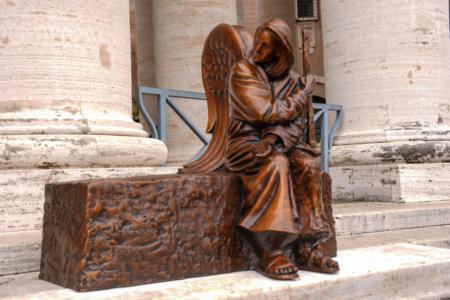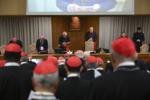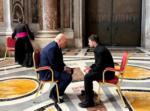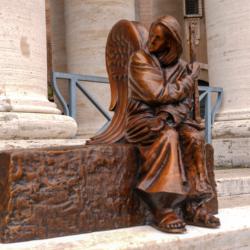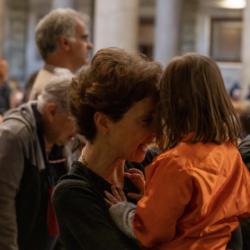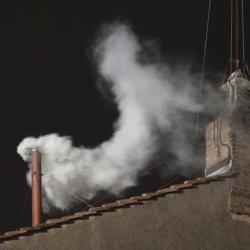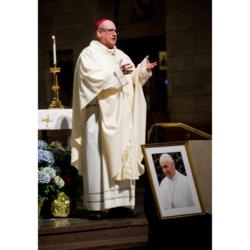Whatever happened to sin?
We don’t hear much about it these days. To the modern ear, the word has an irritating, retro ring to it. “Sin” conjures up Salem witches and Elmer Gantry-like preachers praying on the gullibility of the innocent. Sin is clearly out of style. Can you imagine the outcry if a public school teacher brought up the topic of sin in a classroom?
Even in our churches, sin seems to have slipped into the background, an uncomfortable concept to be brought up only on special occasions. The spotlight these days seems to be on the positive, the “good news” of the Gospels. True, but isn’t the root of the good news that Christ died for our sins? If we have lost focus on the uncomfortable fact that we are sinners, doesn’t the good news lose something of its bite? If we’re really not sinners, what’s the big deal? Why do we need to be saved?
Sure. We’re not perfect, but who among us is? But why should we be obsessed with the negative? And, while we’re at it, let’s throw overboard that thoroughly dated idea of guilt. We all have been warned endlessly not to be “judgmental,” and further taught about how crippling dwelling on our sins can be. And then when we open our eyes and check into cable television news, it’s hard to really consider ourselves sinners. We haven’t caused the massive loss of life. We haven’t cooked any corporate books or caused thousands to have lost millions. We haven’t kidnapped or raped or tortured anyone. Actually, watching the news is rather personally affirming.
Further, if we reduce, as we have, the devil to a Halloween cartoon figure with a red suit and a pitch fork, it is even harder to take sin seriously. The comedian, Flip Wilson, in his comedy show of a few decades ago played a character, the Rev. Leroy, who always got a laugh with the line, “The devil made me do it.” How convenient for you, reverend. Looking at the world in black and white, good and evil is not in step with modernity. Rules change, values shift, and the lines between right and wrong are melding.
Still, though, as the late Msgr. Ronald Knox said, “It is so stupid of modern civilization to have given up believing in the devil when he is the only explanation of it.” He would surely add, however, that when we sin we ascent to the reality of the devil. We cooperate with him. Currently, though, most of us now have more sophisticated explanations for our transgressions.
Sin has all but evaporated from modern consciousness and with it the sense of what is good and evil. Judgment, eternal or temporal, is intolerant in today’s world. By contemporary taste, such ideas are rigid and illiberal. The one remaining exception around which all but for a few whackos and the most hard-heart of capitalist running dogs will rally is a sin against the environment (not against the laws of nature, mind you.). Even our public schools become strangely theological when the subjects of fossil fuels and melting ice caps come up.
The departed Sen. Daniel Patrick Moynihan pointed out to us that for some time we have been “defining deviancy down.” Yesterday’s lie is today’s spin. What a few decades ago was shameful sodomy is now celebrated as the gay lifestyle. The concept of sin has been a major victim of this cultural shift.
Try this thought experiment. See if you can name the Seven Deadly Sins. (We tried and failed. Thankfully, there is always Google). Translating the Seven Deadly Sins into mod- think would look something like this:
Pride is actually healthy self-esteem, a deep appreciation for one’s worth. Humility, on the other hand, clearly is for wimps.
Covetousness or greed is actually a social good. Our impulse to covet is what keeps the economic system humming. Without the drive and desire to possess, the “next new thing” would languish on the department store’s shelf. If greed goes, the economy’s engine stops and we slip back to the Dark Ages or worse.
Sloth is just an unnecessarily disagreeable way of looking at well-deserved relaxation. It is a thoroughly un-American sin. It is an insult to our national credo of “Work hard, play hard and spend as much time in front of the screen as possible.” However, just as the idea of sloth being sinful was about to pass away, the sloth-is-sinful police have coined new words, such as “slacker” and “couch potato,” thus rocking our national BarcaLounger.
Lust has been badly misunderstood. Like greed, lust keeps the engines going. Without it, we’d stop dating and mating and populating. We would implode like the non-immigrant population of Europe. Without it, our TV crime shows would be reduced to shows about crime rather than nubile, scantily-dressed young things leaning over nubile, scantily dressed corpses.
Anger, too, has been given a bad rap. Anger is a safety mechanism, a healthy release of bottled up pressures. Also, it keeps others in line. It lets them know you are the top dog. Road rage, tailgating, exhibitionist weaving in and out of lanes with inches to spare, all are healthy alternatives actually to ramming our cars into the cars of our fellow drivers.
Gluttony is tricky. Who, but a prig, could be offended by feasting, by filling oneself with great food and strong drink? Isn’t this a compliment to your host, or perhaps your waiter? No, the problem is with gluttony’s effect: obesity. Even in the face of the nation’s huge growth spurt of fatties, obesity has few defenders. The rule is eat, drink and be merry, but just don’t gain an ounce! Girth rather than gluttony is the sin.
Envy, too, is hardly a sin, but a useful social mechanism. The resentful desiring of something possessed by another is a plus! Without it, we’d never get out of bed in the morning. We’d be lying around in our mud huts, as happy and passive as clams. We would just dumbly smile as our neighbor showed off her new Crock-Pot or his new plastic fly swatter. The most important words in our language are, “If only I had....”
Clearly, however, sin is in retreat. The modern world has taken a good look at sin and found it both unwanted and dysfunctional. Opinion polls, our true source of authority, back this up. Blessedly, sin is on the way out.
Kevin and Marilyn Ryan edited “Why I Am Still a Catholic” [Riverhead Books, 1998] and live in Chestnut Hill, Mass.
